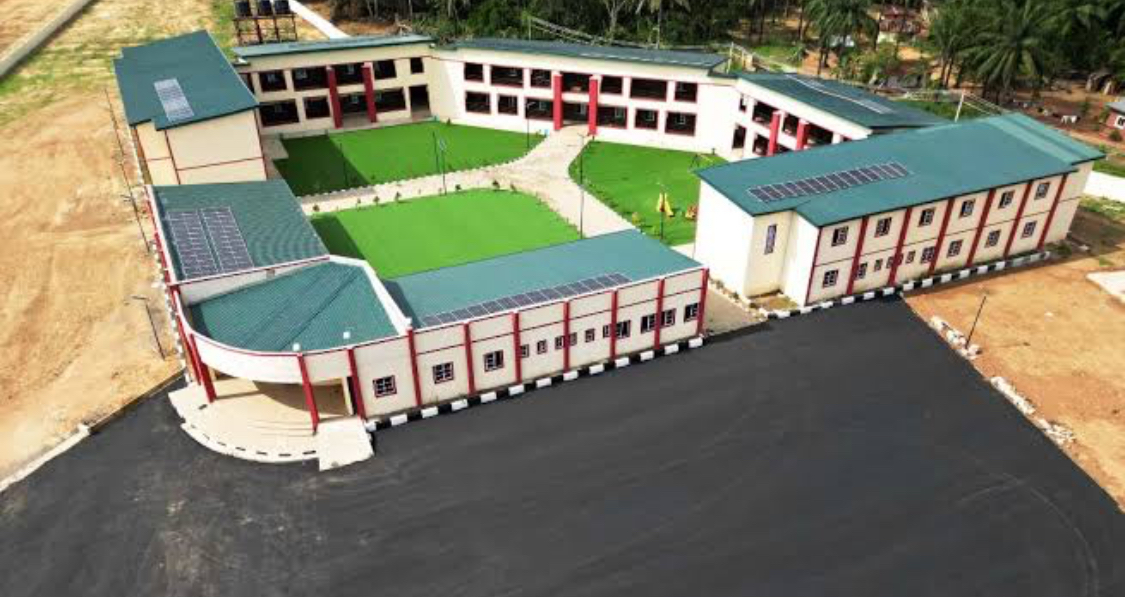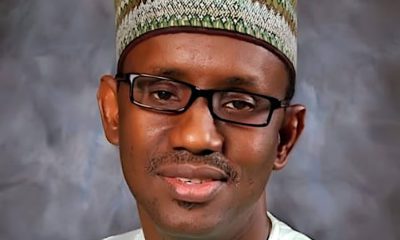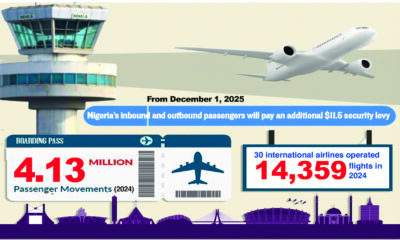
Education
FG reintroduces History as compulsory subject in primary, secondary schools

The Federal Government has reintroduced Nigerian History as a compulsory subject in the basic education curriculum to strengthen national identity, unity, patriotism, and responsible citizenship.
The Federal Ministry of Education announced the introduction in a statement on its official X account on Wednesday.
“For the first time in decades, Nigerian pupils will study History continuously from Primary 1 to JSS3, while SSS1–3 students will take the new Civic and Heritage Studies, integrating History with Civic Education,” the statement read.
“Primary 1–6: Pupils will learn about Nigeria’s origins, heroes, rulers, culture, politics, economy, religions, colonial rule, and post-independence governance.
“JSS1–3: Students will study civilisations, empires, trade, European contacts, amalgamation, independence, democracy, and civic values.”
According to the Ministry of Education, this reform is a priceless gift to the nation, reconnecting children with their roots while inspiring pride, unity, and commitment to national development.

The ministry has released the revised curriculum and will retrain teachers, provide resources, and strengthen monitoring.
Education
Enugu Leads Nigeria’s Shift to Smart Green Schools

… Acknowledges teething challenges, but resolved to deliver
… Justifies 33% budgetary allocation to education
Enugu State, on Monday, ushered in a new epoch in its history and the life of the state’s children, as it officially began the transition from existing primary and junior secondary schools to Smart Green Schools, Governor Peter Mbah’s signature initiative in the South East state.
In a broadcast to usher in the new era Monday morning, Governor Mbah said the shift from old school structures and learning by memorisation to world-class infrastructure and experiential learning had become imperative to equip Enugu children with knowledge and skills to compete in the global economy, stressing that “we are no longer a state waiting to be saved – we are a state shaping the future on our own terms.”
“Africa today is the youngest continent in the world. More than 60% of our people are under the age of 25. By 2050, our population will reach 2.5 billion, and one in every three young people on earth will be an African. This is a stark reminder that our future will be built by young hands.

Enugu Smart Green School
“This is not just a statistic; it is a summons. It means that the destiny of African nations rests on what we nurture in the minds and hearts of our children.
“If we raise them well and leave them opportunity, when they inherit tomorrow; when they own it; they will shape it and defend it. If we fail them, no amount of slogans will save us,” he stated.

Mbah said his administration’s slogan, “Tomorrow is here,” was not just a catchphrase for Enugu, but “a covenant with that future,” adding that Africa’s sovereignty rests on the quality of its human capital.
“It is the recognition that the sovereignty of our state, of Nigeria, and indeed of Africa, will be determined by the strength of our young people – their ability to think critically, to innovate, and to act with integrity.
“Our sovereignty begins in the classroom. It begins with how we choose to welcome the child into the world. And this takes time, care – and investment,” he said.
Citing his personal experience where he had to journey from “the slums of Port Harcourt, where every day was a struggle and nothing was guaranteed,” Mbah said education and resilience were his “passport to a life of possibility.”
He, however, maintained that Enugu children did not have to go through such ordeals on account of economic circumstances, insisting that education must be treated as a public right.
“At home and at school, when a community receives and educates each child as a whole human being, it is akin to public service at the deepest level.
“The habits a child rehearses – attention, curiosity, patience, empathy, self-belief – become the civic habits of our culture. A school day shaped by rhythm, responsibility, and care quietly trains the nervous system for self-regulation and the social muscle for cooperation.
“Those capacities later show up as lower violence, stronger communities, and a public square that can tolerate disagreement without tearing itself apart.
“The school, then, is not just a service; it is a commons where the human village renews itself,” he added.
Noting that the Smart Green Schools represent the most personal and transformative project of his leadership, he explained, “They are not only schools – they are my promise of a new society; my covenant with the Enugu child. In them, Tomorrow Is Here finds its truest form.
“Each of the 260 schools is designed as a complete ecosystem for learning. ‘Smart’ means integrating technology, critical thinking, and problem-solving into every subject. Each has about 25 digitally-connected modern classrooms, ICT centres, robotics and AI labs, e-libraries, and spaces for experiential learning.
“They are ‘green’ because they have renewable energy sources and smart farms where children plant, grow, and harvest, learning agriculture not as theory but as practice.
“And they are inclusive. Every child is provided with free uniforms, books, meals, and tablets. Each school has its own medical clinic, reliable water systems, and community halls that anchor the school in village life. Housing for teachers is on-site so that the best educators live within the communities they serve, ensuring continuity of care and commitment.
“Smart Green Schools are not just an investment in classrooms, but in the soul of our people. The habits a child rehearses, of curiosity and collaboration, become the civic habits of the culture. A generation raised in schools of innovation will build an economy of innovation. A generation raised in classrooms of fairness will create a politic of justice.
“So, those buildings are beyond mere bricks; we see in them children eagerly looking forward to the future.”
He said that while a child could pass through six years of schooling and still be limited to memorising theories on a chalkboard under the old system of learning, “in the new model, the classroom is a creativity hub; learning becomes experiential; theory meets practice, and knowledge is translated into tangible skills; children are able to put into practice what they have learnt.”
The governor, however, acknowledged some challenges in building the 260 new schools simultaneously, but restated his administration’s resolve to see the initiative through.
“This journey has not been easy. We know that every Smart Green School is not yet complete. There have been setbacks, delays, and challenges to overcome.
“While some schools will open today, some will open next week, and yet some more in a fortnight.
“We do not claim perfection. What we do claim is resolve.
“We set out with a bold vision, and boldness sometimes requires a little more time. But by all means, every school shall be open this term. No school’s academic calendar will be interrupted. We have planned for every contingency.
“Make no mistake: we will deliver. Because attending a Smart Green School – even if it means waiting a few more weeks – is worth it. It is the transformation of a lifetime for our children, and we ask for your patience as we finish the work. We’re doubling down on our commitment,” he assured.
He urged the communities to protect the schools as if they were their own children.
“These schools are a once-in-a-lifetime opportunity to bring world-class education home to Enugu. Cherish them. Defend them. Guard them as a community. Take shared responsibility for our future, which is walking in on two small feet every time a child enters these gates.
“Support the teachers – the custodians and guardians of our future farmers, entrepreneurs, nurses, artists, engineers, lawyers, and leaders.
“They are the cornerstone of this transformation. Equipment and buildings matter, but machines do not teach; people do,” he stated.
He added that his administration has invested in continuous professional development, in mentorship programmes, and in the tools teachers need to deliver child-centred and competency-based learning.
Mbah insisted that his administration’s investment of 33 percent of the state’s budget in education was worth it, as “the wealth of human potential is the truest capital of our society.”
Education
NECO releases 2025 SSCE results, records only 60% pass rate

The National Examinations Council has released the 2025 Senior School Certificate Examination (SSCE internal) results, 54 days after the last written paper.
NECO Registrar, Prof Ibrahim Wushishi, who announced the release of the results at a press conference in Minna, Niger State, on Wednesday, said out of the 1,358,339 candidates who sat for the June/July exercise, 818,492, representing 60.26 per cent, scored 5 credits and above, including Mathematics and English.
Wushishi stated that the number of candidates with five credits and above, irrespective of Mathematics and English is 1,144,496, representing 84.26 per cent.
He said, “Number of candidates that registered for the examination is 1,367,210, representing 685,514 Males and 681,696 Females.
“Number of candidates that sat is 1,358,33,9 representing 680,292 Males and 678,047 females.
“Number of candidates with five Credits and above, including Mathematics and English is 818,492 representing 60.26%.

“Number of candidates with five Credits and above, irrespective of Mathematics and English is 1,144,496 representing 84.26%.”
Recall that the 2025 Senior School Certificate Examination was conducted from Monday June 16, to Friday July 25, 2025.
Wushishi stated that the number of candidates with special needs was 1,622, out of which candidates with hearing impairment were 586 males and 355 females, and candidates with visual impairment were 111 Males and 80 Females.
On the number of examination malpractice cases, the registrar noted that in the 2025 SSCE internal, the number of candidates involved in various forms of “malpractice was 3,878, as against 10,094 in 2024, which shows a reduction of 61.58 per cent.”
He added, “During the conduct of the 2025 Senior School Certificate Examination, 38 schools were found to have been involved in whole school (Mass) cheating in 13 States. They will be invited to the Council for discussion, after which appropriate sanctions will be applied.
“Similarly, nine Supervisors: three in Rivers, one in Niger, three in FCT, one in Kano and one in Osun States were recommended for blacklisting due to poor Supervision, Aiding and Abetting, Lateness, Unruly behavior, Assault, and Insubordination.
“I wish to also draw your attention to a case in Lamorde Local Government, Adamawa State involving eight Schools which were affected by a communal clash resulting in the disruption of our examinations from 7th to 25th July, 2025. A total of thirteen Subjects and twenty-nine Papers were involved.
“We have since commenced talks with the State Government with a view to conducting the examinations for the affected Schools.”
He announced that in view of the reviewed curriculum, which is currently being implemented, NECO will conduct the SSCE examination on only 38 subjects, which will reduce the waiting time for the results.
While providing a breakdown of performance by states, he noted that Kano came top with 68,159, representing 5.020 per cent of candidates scoring five credits and above, including English and mathematics.
Lagos came second in performance with 67,007 or 4.930 per cent of candidates, scoring five credits and above, including English and mathematics, while Oyo came third with 48,742 candidates scoring five credits and above, including English and mathematics.
The least performing centre was Gabon, with no candidate scoring five credits and above, including English and mathematics.
The Examination Council recently announced the transition from the Paper-Pencil Test model, known as the PPT model to Computer-Based Test Model, with a number of private and public schools taking part in the first phase of the transition.
Education
Enugu Smart School Debate and Mbah’s Relentless Vision

By Dan Nwomeh
I have taken time to peruse the avalanche of comments that have trailed the Enugu Government and Sujimoto saga. They range from those who genuinely mean well, to those who think they have finally found the soft underbelly of Governor Peter Mbah’s administration to viciously attack, sometimes for unrelated grudges, to the habitual armchair critics who neither understand nor care to understand the concept of the Smart Green School, nor even what it looks like. I noticed some private school entrepreneurs and their beneficiaries who are threatened by the very idea of tuition-free, free-uniforms, free-learning-materials, and free-meals-per-day Smart Schools. There are also those who persist in asking why the government should construct new schools rather than renovate the existing dilapidated ones, most of them relics of the colonial era, eyesores that stand shamefully beside magnificent churches in many of our villages.
But let us pause and ask: Who among these loud critics would renovate a crumbling family house left by their grandfather when they have the resources and desire to build a new home designed for modern living? Who among them would patch up cracked walls, replace leaking roofs and broken windows, instead of constructing a brand new house with electricity, ensuite rooms, screeded walls and tiled floors, POP ceilings, conduit wiring and plumbing, solar lights, internet connectivity, smart security doors, and CCTV camera surveillance? Who does that? If no one in their right senses does that for their family, why do we want such treatment visited on our children, especially those who cannot afford expensive private schools? Why should we condemn them to learning in depressing classrooms that belong to the past, while their age mates elsewhere enjoy environments tailored for today’s realities and tomorrow’s opportunities? And would those who advocate for renovation alone send their own children to those schools? If not, what does that say of their wish for other people’s children, so long as nobody asks them to pay taxes?
The Smart Schools initiative is not about erecting just another set of classrooms; it is about redefining the very idea of education in Enugu State. The brick and mortar, 260 expansive pentagon-shaped buildings across all wards, are only the beginning. Within those walls lie the foundations of an entirely new model of learning, a complete shift from rote memorization to experiential, hands-on education. A space where tech and innovation are embedded into daily learning — coding and robotics, digital labs and libraries, innovation hubs, and multimedia studios. These schools are designed to prepare our children not only to pass exams, but to create tools, solve problems, and compete with their peers across the world. The children of Enugu deserve better. For too long they have been cheated, their today and tomorrow denied and mortgaged, forced to endure outdated structures and outmoded methods while their counterparts in organized societies moved ahead.

Entrance to an Enugu Smart School structure
Governor Mbah has left no one in doubt as to the depth of his commitment. He has said repeatedly that his dream is for his grandchildren, if not his children, to be educated in the Smart Schools right here in Enugu. He is not allocating 33% of the state budget to education, back-to-back in two years, if he did not consider this the most consequential paradigm shift in the life of our state. Investment and spending are always a statement of priority, and in Mbah’s case, he is literally putting our money where our mouths are.

It is therefore astonishing that some would question the integrity of the governor, who has shown uncommon transparency in this entire matter. When questions arose over Sujimoto, owned by Olasijibomi Ogundele, it was the governor himself who invited the Economic and Financial Crimes Commission (EFCC), opened the books, and placed every transaction on the table for scrutiny. Who does that if he has anything to hide? Which leader engaged in shady deals has so openly embraced accountability, welcoming investigators to track the financial trails? If anything, this is the clearest sign that the governor has nothing to conceal, only a determination to deliver a bold vision for our children.
Some have even raised the disappointing argument of why 22 Smart Schools were awarded to a Yoruba contractor in the first place. But this is petty tribalism at its worst, however it is dressed. Let’s face it: should an Enugu boy who conquered the downstream oil sector in Lekki, Lagos, thanks to the accommodation and support he enjoyed there, end his story by erecting walls of ethnic suspicion at home? Do Igbo contractors not get contracts in Lagos, Abuja, Kano, and elsewhere? Why then should 22 schools out of 260, a mere 8.4 percent, be turned into an ethnic slur? What matters is whether the job is delivered, not where the contractor comes from. A Yoruba contractor may have failed Ndi Enugu, but his failure lies squarely with him.
Sujimoto tried to rationalize his failure by citing price increases. Yet other contractors delivered the same Smart Schools within the same cost framework. He also argued that N523 million per school (buildings only, it must be added) was insufficient, but that claim only further demolishes the falsehoods of government critics. If indeed the amount was not enough, then it proves there was no contract padding, and no excess slush funds to siphon. This is a case of a contractor with fraudulent motive ab initio, a contractor defaulting on a contractual agreement, not of a government conniving in fraud.
Our people love to speak of Lee Kwan Yew of Singapore, the man who transformed a small island into a global economic powerhouse. Yet very few care to understand the painful side of reforms, the sacrifices the people endured for the tomorrow they now enjoy. Smart Schools are that kind of reform. They may disrupt the old order, they may demand more investment and patience, but they are the road to a future where Enugu’s children are no longer left behind. Greatness is never built on convenience; it is built on vision, sacrifice, and perseverance.
The Smart Schools are far too advanced to be derailed. Beyond the hoopla, the construction and equipping of these schools are ongoing across the state, with many already completed and equipped. The vision is undimmed and the pace undeterred, whatever the minor challenges. The governor remains focused on giving our children a new learning experience, one that rivals the best private schools and outclasses anything public education in this state has ever known. It is not about optics; it is about outcomes. It is about ensuring that the child in my village of Ozalla, or in Umuida, or Nkwe, has the same chance at a 21st-century education as the child in advanced societies.
In the end, the voices of destructive criticisms and sponsored attacks will fade. Those attacking the government today will tomorrow return to praise it because results will speak louder than rhetoric. When the Smart Schools open their doors, when children in uniform sit behind computers, design robots, create gadgets, act on modern stages, learn in well-lit classrooms cooled by solar power, use digital boards and android tablets with internet access, and are inspired by teachers trained in modern pedagogy, the truth will be undeniable that Enugu State has raised a new standard in public education and produced new generations of tech-savvy children equipped to take on the world.
Again and again, Governor Mbah will not be deterred by detractors. He is not in the business of appeasing cynics or seeking public applause or cheap popularity. He is in the business of preparing our children for a tomorrow that is already here.
-

 News3 days ago
News3 days agoJUST IN: Police ban Agunechemba, other vigilantes from functioning during Anambra election
-

 News2 days ago
News2 days agoTerrorists threaten to bomb National Assembly, Reps raise alarm
-

 News12 hours ago
News12 hours agoAlleged Coup: Details of detained 16 officers emerge
-

 News2 days ago
News2 days agoCoup Controversy: Military interrogates MD, raids ex-gov’s house, arrest two aides
-

 News2 days ago
News2 days agoTinubu reverses Maryam Sanda’s pardon, convict to spend six years in jail
-

 News3 days ago
News3 days agoPolice repel gunmen attack in Ezinifite, neutralize suspect, recover firearm
-

 News11 hours ago
News11 hours agoAir force officer detailed to kill Ribadu in foiled coup plot
-

 News3 days ago
News3 days agoNigerian int’l travellers to pay extra $11.5 charge per ticket from Dec. 1

























